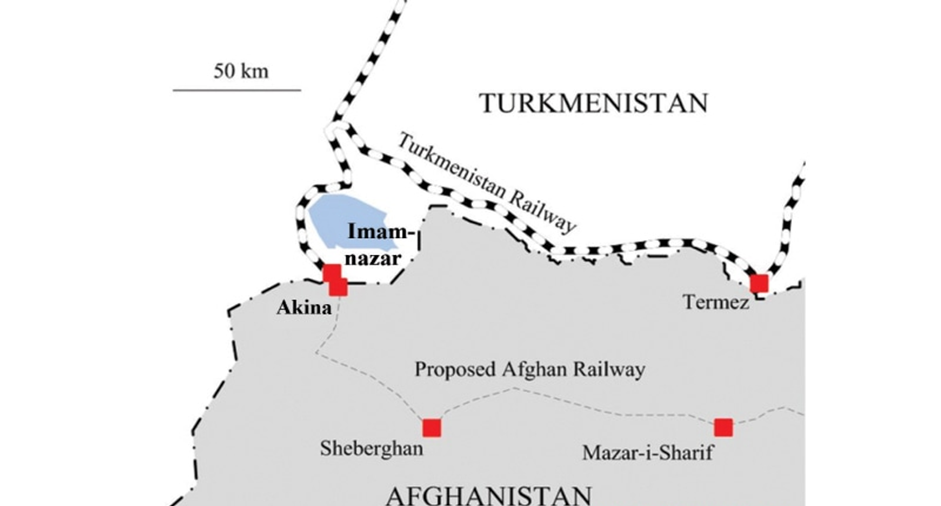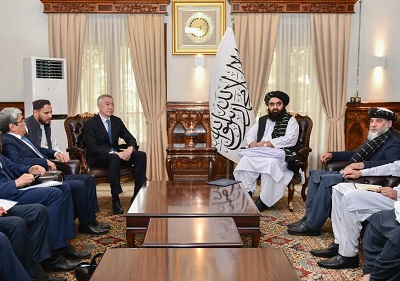Context-
Since the Taliban's takeover of Afghanistan in August 2021, the group has made significant strides in establishing diplomatic relations in Central Asia. We look into the key developments in the Taliban's diplomatic engagement with Central Asian countries, highlighting the motivations behind these efforts and the implications for regional stability.
Diplomatic Engagements
- Recent Meetings and Infrastructure Projects : On July 20, 2024, Taliban officials held discussions with representatives from Kazakhstan and Turkmenistan to explore the construction of a new railway line that would connect Turkmenistan to Pakistan via Afghanistan. This initiative is part of a broader strategy aimed at enhancing economic cooperation, fostering regional connectivity, and establishing stability in the region. Initially met with skepticism, the Taliban has gradually gained traction through strategic diplomacy and economic engagements.

The geopolitical landscape has changed significantly due to ongoing conflicts, particularly in Ukraine and the Middle East, prompting Central Asian republics to adopt a more conciliatory approach towards the Taliban-led Islamic Emirate of Afghanistan (IEA). With a 2,387-kilometer porous border shared with Afghanistan, Central Asian countries have recognized that imposing sanctions on the Taliban would only exacerbate regional instability.
- Security Concerns : Compounding this diplomatic engagement are the security challenges posed by the presence of approximately 3,000 fighters from various terror groups, such as the Islamic Movement of Uzbekistan, Islamic Jihad Union, Jamaat Ansarullah, and the Islamic State of Khorasan Province, who operate within Afghanistan. This situation necessitates a delicate balance between diplomatic outreach and security concerns for the Central Asian nations.
Changing Attitudes in Central Asia
- Uzbekistan’s Shift in Policy : Historically, Uzbekistan supported the anti-Taliban United Front (Northern Alliance) during the late 1990s. However, it has since emerged as one of the first Central Asian countries to establish direct ties with the Taliban. This policy shift has coincided with a marked increase in trade between Uzbekistan and Afghanistan, with bilateral trade figures surpassing USD 461.4 million in the first six months of 2024. The two nations are also negotiating the implementation of the Most Favoured Nation status to further enhance their economic ties.
In May 2024, both countries reaffirmed their commitment to completing the USD 4.8 billion Trans-Afghanistan Railway project, which aims to connect Uzbekistan to Pakistan through Afghanistan. Uzbekistan has not only shown interest in investing in Afghanistan’s electricity and railways but has also provided substantial humanitarian aid, amounting to 1,000 tons of essential supplies to Kabul.
- Kazakhstan’s Diplomatic Rapprochement : Kazakhstan has also taken significant steps towards diplomatic engagement with the Taliban, removing the group from its list of banned organizations. This decision reflects Kazakhstan's recognition of the importance of fostering trade and economic cooperation with Afghanistan, acknowledging the Taliban as a long-term factor in the region. In April 2024, a high-profile Kazakh delegation visited Kabul for the third Kazakhstan-Afghanistan Business Forum, focusing on diversifying cooperation in sectors such as chemicals, mining, and metallurgy.
Trade figures between Kazakhstan and Afghanistan reached a record high of USD 987.9 million, with expectations that this number could soon exceed USD 3 billion. Kazakhstan's proactive approach to developing healthy relations with Afghanistan includes sending ambassadors to Kabul and welcoming Taliban-appointed ambassadors to its own capital.
- Turkmenistan’s Neutral Stance : Turkmenistan has maintained its policy of neutrality while engaging with the Taliban. On July 15, 2024, the Turkmen Ambassador met with the Taliban’s foreign minister to discuss critical infrastructure projects, including the Turkmenistan-Afghanistan-Pakistan-India (TAPI) pipeline. The two nations also explored opportunities for expanding transport and transit connections, as well as a joint power project at the Nurul Jihad substation in Herat province.
Furthermore, Turkmenistan and Afghanistan signed ten contracts worth over USD 200 million to enhance trade and economic ties, aiming to reintegrate the Afghan economy into the regional economic framework. Another major joint initiative under consideration is the Turkmenistan-Afghanistan-Pakistan (TAP) power transmission project, which seeks to transmit electricity from Turkmenistan to Pakistan through Afghanistan. This project, estimated to cost over USD 1.6 billion, is expected to generate significant benefits for Afghanistan, including job creation and annual transit rights valued at USD 100 million.
- Challenges with Tajikistan and Kyrgyzstan : Despite the Taliban's efforts to strengthen relations, challenges persist. Tajikistan's President Emomali Rahmon, facing economic difficulties and a long tenure in power, has adopted an ethnic nationalist approach to garner support at home. However, the Taliban has managed to maintain the flow of electricity from Tajikistan to Afghanistan, with Tajikistan supplying 1.6 billion kilowatt-hours of electricity in 2023.
Similarly, relations with Kyrgyzstan have improved, despite concerns regarding the situation of ethnic Pamir Kyrgyz in Afghanistan. In January 2024, the Kyrgyz Commerce Minister met with the Taliban's Foreign Minister to discuss increasing trade opportunities, establishing a transit route for Afghan traders to China through Kyrgyzstan, and supporting the Central Asia-South Asia power project (CASA-1000). This renewable energy project aims to transmit 1,300 megawatts of surplus electricity from Central Asia to South Asia, further solidifying trade and connectivity ties.
Causes for Change and Implications
Geopolitical Context
The Taliban's recent diplomatic successes in Central Asia can be attributed to a combination of factors. Firstly, the group's effective re-engagement with its neighbors has been driven by shared economic interests and a collective desire for regional stability. The changing geopolitical landscape, characterized by new rivalries and conflicts in the Middle East and Ukraine, has allowed the Taliban to transition from diplomatic isolation to a more prominent role on the regional stage.
In the first half of 2024, Afghanistan's foreign trade reached USD 5 billion, with exports valued at USD 700 million, further underscoring the Taliban's economic ambitions and regional integration efforts.
A New Reality
The Taliban's ability to foster relationships with countries such as China, Iran, Russia, and Central Asian states has solidified its position as a significant player in the region. The Taliban's representation of Afghanistan at international forums, including the United Nations-led international conference in Doha, demonstrates this shift in perception. Increased diplomatic engagements have contributed to the Taliban's growing influence and its recent decision to sever consular ties with embassies in Western countries, citing loyalty to the previous Afghan government.
While official recognition of the Taliban regime remains elusive, the group has effectively positioned itself as a recognized government in the eyes of its neighbors and international forums. This growing acceptance blurs the lines between de facto and de jure recognition, indicating a profound shift in Afghanistan’s global standing and the increasing normalization of the Taliban's presence in regional politics.
Conclusion
The Taliban's diplomatic advances in Central Asia signify a critical juncture in regional geopolitics. Driven by a combination of economic cooperation, security concerns, and geopolitical dynamics, the Taliban has managed to re-establish itself as a key player in the region. While challenges remain, particularly with certain Central Asian nations, the overall trajectory suggests a growing acceptance of the Taliban as a significant actor in regional affairs. As Central Asian countries navigate their relationships with Afghanistan, the implications of this new diplomatic landscape will resonate throughout the region and beyond.
|
Probable Questions for UPSC Mains Exam-
|
Source- ORF







